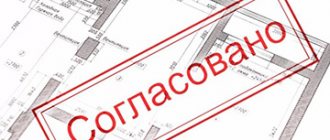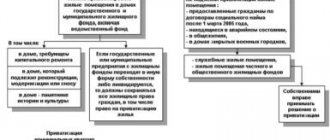Some time ago, the media was full of headlines about the extension of the privatization period, “have time to privatize,” “there will be no second chance.” Now the privatization process has been made indefinite. Let's consider who has the right to privatize residential premises and what is necessary for this.
First, let's understand what privatization is. Privatization is the free transfer to citizens of the Russian Federation into ownership on a voluntary basis of residential premises occupied by them from the state and municipal housing stock.
So, based on the provisions of the Law “On the Privatization of Housing Stock in the Russian Federation,” it is possible to privatize apartments that are the property of the state or municipality.
What housing can be privatized
Not every piece of real estate in the Russian Federation, regardless of its type, can be privatized:
| Can be privatized | Cannot be privatized |
| Apartments belonging to the state or municipal housing stock. | Emergency housing. |
| Rooms in dormitories belonging to the housing stock. | Housing located in gated communities. |
| Office premises with the consent of the owner. | Rooms in dormitories that are not part of the housing stock (for example, service dormitories). |
| Residential buildings located on a non-privatized land plot. | Service apartments/houses, without the consent of the owner. |
Separately, it is necessary to say about service-type residential premises. Regardless of the basis on which they were transferred to the current owner (it is likely that they were received free of charge from the state), at the moment they are considered private property (possessions of a company/enterprise/organization) and therefore they cannot be privatized under any circumstances. grounds, if there is no consent of the current owner.
In addition, residential buildings also deserve attention. In the vast majority of cases, they have nothing to do with the state/municipal housing stock.
But the land may well belong to the state or local administration and be transferred for use on the basis of a lease agreement. In the latter case, privatization actually concerns the plot of land, and not the house, which is “trailered” to the territory acquired into ownership.
What kind of housing can be registered as a property?
Housing that can be registered as a property includes apartments, houses, and land plots that are not in disrepair.
If necessary, the living space is inspected by authorized authorities. If it turns out that it is not suitable for habitation, then privatization will be impossible and a refusal will be issued.
It is also possible to privatize an apartment that is not located in a closed military camp.
For what other reasons will citizens be denied privatization? This may be in the following situations:
- if the apartment is located in a departmental building;
- if the living space is issued under the terms of an employment contract and is for official use;
- the entire building is in disrepair, residents are subject to eviction from it and new apartments are provided;
- other reasons specified in the legislation of the Russian Federation.
If privatization was refused, the citizen can appeal this decision in court.
There are several pros and cons of shared privatization of an apartment. How to find out if an apartment is privatized? Read here.
Who has the right to privatize housing
- The potential owner/owners must enter into a social tenancy or lease agreement with the local administration or state.
- Privatization is possible only once in a lifetime (for minors at the time of the first privatization - 2 times in a lifetime). As a result, in order to participate in the procedure, a person had to not previously participate in it.
- All persons who officially reside in a given premises can participate in privatization, even if at the time of the procedure they are serving in the army, serving a sentence, on a business trip, and so on.
Rights acquired after privatization
Immediately after the ownership right is registered in Rosreestr (the last stage of privatization), the new home owners receive an apartment/room/land/house for their full and undivided use. They can:
- Pass it on by inheritance.
- Sell.
- Carry out redevelopment.
- Rent out and so on.
- Register as collateral with the bank.
Expert opinion
Kurtov Mikhail Sergeevich
Practitioner lawyer with 15 years of experience. Specializes in civil and family law. Author of dozens of articles on legal topics.
At the same time, they are required to pay real estate taxes, and also risk losing their property if they do not repay the bank loan for which the premises were secured.
FREE CONSULTATIONS are available for you! If you want to solve exactly your problem, then
:
- describe your situation to a lawyer in an online chat;
- write a question in the form below;
The law on the privatization of residential premises in the Russian Federation was adopted more than a quarter of a century ago, but still not everyone has exercised their right and a huge amount of real estate still belongs to the state. Today we will figure out who has the right to participate in privatization, what requirements the legislator places on them.
Why is privatization needed?
Privatization refers to the transfer of ownership rights to a residential property to citizens who live and are registered in this housing space under social rental conditions. The state, as the owner of real estate, acts as a lessor, and the persons registered in the apartment and exploiting it are tenants. When housing is privatized, it becomes the private property of the tenant. This is done on the following principles:
- principle of accessibility - every citizen of the Russian Federation over the age of 14 has the right to privatize a state apartment;
- one-time principle - this right can be used only once in a lifetime (except for the cases described above);
- the principle of gratuitousness - new owners of real estate receive personal property free of charge, without paying the cost to the municipality. Only the services of government bodies are paid for registering property rights, as well as for preparing and collecting the necessary documents.
As soon as the law on privatization was adopted, Russian citizens were perplexed about what it was and why, because they already have a roof over their heads, no one is kicking them out of their homes. Therefore, privatization did not become a mass phenomenon and even alarmed many. The authorities assumed that within a certain period of time everyone would have time to privatize their homes, but people were still in no hurry to do this, which is why the period allotted for the privatization of municipal and state housing stock was extended several times.
As of today, free privatization of housing will last until the beginning of March 2020, after which citizens will have to pay its full cost to the treasury in order to register their housing as private property. But the Russian government is seriously thinking about making privatization indefinite, since extending it every year is not only impractical, but also illogical. This is an extra waste of time and additional administrative costs.
In principle, refusing to privatize municipal housing is simply stupid. After all, privatized living space literally “frees the hands” of its owners. They acquire the right to dispose of real estate, which cannot be done with municipal housing. Ignorance and lack of understanding of all the benefits of privatization explains why this process dragged on for many years.
The positive aspects of privatization are as follows:
- after the death of the owner, the apartment is inherited by his direct heirs;
- the owner can bequeath his property to third parties;
- housing can be sold and make a good profit;
- it is possible to issue a deed of gift for an apartment;
- you can register and discharge anyone you want, whenever you want;
- in the case of a privatized apartment, it is much easier to agree on the issue of reconstruction and redevelopment of the premises;
- the home can be rented out, receiving regular additional income for this;
- You can use the apartment as collateral for a mortgage - take out a mortgage on it, etc.
There are many advantages of privatization, and all of them are of no small importance, but there is another side to the coin - along with the rights to housing, the newly minted owner also acquires certain obligations:
- the need to pay property tax (every year);
- when selling privatized housing in the first three years after registration of rights to it, you must pay personal income tax in the amount of 13% of the cadastral value of real estate;
- all expenses for maintaining the privatized home and common area fall on the shoulders of the new owners.
Important! Payment of personal income tax can be avoided if you sell a privatized apartment 3 or more years after its privatization or take advantage of the right to a tax deduction.
Need a lawyer
If you have a question about who the persons entitled to privatization are, and whether you are one of them, then contact the specialists of our website for a free consultation. In addition, they will be able to answer your other questions related to the conversion of public housing into private ownership.
In general, if you decide to tackle this rather complex process, then it is best to use the services of a professional lawyer specializing in housing law. He will be able to collect all the documents, determine the circle of persons who can participate in privatization, and apply on your behalf to all authorities.
This will help you save not only your energy, but also your time.
- Due to constant changes in legislation, regulations and judicial practice, sometimes we do not have time to update the information on the site
- In 90% of cases, your legal problem is individual, so independent protection of rights and basic options for resolving the situation may often not be suitable and will only lead to a more complicated process!
Therefore, contact our lawyer for a FREE consultation right now and get rid of problems in the future!
Definition
First, let's figure out what exactly we are talking about. What is privatization? Why is it needed? Who has the right to privatization?
This term characterizes the process of transferring property (housing) into private ownership. Most often we are talking about state apartments. After privatization, citizens become full owners of housing free of charge.
In Russia, you can participate in free privatization only once. After this, you will have to pay for the operation. The exception is minor children - if they participated in privatization, then they retain the right to receive free housing after they reach adulthood.
2. What documents are needed to privatize an apartment?
- a request (application) for the provision of a public service - can be completed by an employee during the application (or you can prepare it in advance by downloading the form);
- identification document of the applicant;
- identity document - for all members of the applicant’s family, persons registered in the privatized residential premises, persons who have the right to use this premises on social rental terms, who have reached the age of 14;
- an identity document of the applicant's representative, members of the applicant's family, persons registered in the privatized residential premises, persons who have the right to use this premises under social rent, who have reached the age of 14 (if the documents are submitted by a representative);
- a document confirming the authority of the representative (notarized power of attorney);
- social tenancy agreement for privatized residential premises - a copy of the applicant (except for cases of loss of the social tenancy agreement);
- an order for privatized residential premises or an extract from an order of an executive authority (if the applicant has one); in case of loss of the order - a copy of the order of the executive authority issued by the bodies authorized to provide information from the Archival Fund of the Russian Federation;
- a birth certificate or a document confirming the fact of birth and registration of a child, issued in the prescribed manner (in the case of the birth of a child on the territory of a foreign state);
- document confirming citizenship of the Russian Federation;
- an extract from the house register for the period from July 21, 1991 until arrival at this place of residence or a similar document replacing it;
- a document from an authorized body confirming the unused right to participate in privatization at the previous place of residence;
- a document confirming the authority of the above-mentioned body to issue a document confirming the unused right to participate in privatization at the previous place of residence (a copy certified by the body that issued it);
- written consent to privatization (or written refusal of privatization) of the occupied residential premises of the applicant, a member of the applicant’s family, another person registered in the privatized residential premises, a person who has the right to use this premises on the terms of social rent, who has reached the age of 14, and/or his legal representative or a person authorized in accordance with the established procedure. In this case, a notarized written refusal of privatization must be issued no later than 30 calendar days before the day of application for the provision of a public service.
Please note: in some cases (depending on the specific circumstances of your life) additional documents may be required.
Where should I submit documents?
- online on the official website of the Moscow Mayor mos.ru. You can submit documents online only if you live alone or if your family meets the following requirements:
- the family includes only adults who have legally resided in Moscow since July 21, 1991 or since birth;
— there are no disabled adults or orphans in the family;
Please note: the applicant's representative can only submit documents in person. You can check the status of your application on mos.ru. To do this, you need to know the case number.
When will the decision on privatization be ready?
Once your request has been registered, you will receive one of the following documents within 46 business days:
- transfer agreement with a note on state registration of the transfer of ownership of the privatized residential premises - issued on paper in person at;
- a decision to refuse to provide a public service is issued on paper in person, by mail, or sent electronically to the user’s personal account on mos.ru.
If you submitted documents electronically and if the decision on privatization is positive, at the time of signing the transfer agreement you will need to provide the following documents:
- social tenancy agreement for privatized residential premises;
- a warrant or an extract from an order of an executive authority;
- notarized documents, scanned copies of which were attached to the electronic request.
The law on the denationalization of housing stock has been in force in our country since 1991. Nevertheless, despite this, at the current time there are still unprivatized apartments in municipalities, and therefore the question of who has the right to privatize an apartment is relevant in the conditions of modern reality, therefore this rather pressing problem will be discussed in our article.
Summarizing
It is now clear who has the right to privatize housing. This operation is available only to those who permanently reside in a particular territory under social tenancy agreements. Strangers and even relatives of residents are not given the right to participate in the process.
The implementation of the studied procedure can be refused only for compelling reasons. But in practice, such situations arise extremely rarely. They are usually found among the military - housing from the Ministry of Defense of the Russian Federation can be privatized, but this is problematic. If citizens are denied the exercise of their rights, they will have to go to court for justice. Then privatization will be forced.
In practice, this process causes a lot of trouble. In particular, due to the fact that individual residents do not always agree to privatization. But they don’t want to give up this operation either. As already mentioned, in this case it will not be possible to force citizens to give one or another answer. This means that privatization will not take place. The refusal must be certified by a notary and submitted in writing. Oral agreements have no legal force.
Citizens who have the right to privatization usually try to realize this opportunity. In order to avoid problems, it is recommended to discuss plans for privatization of the apartment in advance with residents.
Privatization of an apartment
Privatization of an apartment is the transfer of ownership rights from the state, which until that moment was the sole owner of this residential premises, to a private individual. Often, this procedure for many Russians is the only possible way to acquire their own square meters, since such denationalization of the housing stock is carried out free of charge, that is, without contributing any amounts of money to the state treasury, except for a symbolic state duty.
Mass privatization of the housing stock in our country has been going on since 1991, but despite the vastness of our homeland, there are still citizens who have not taken advantage of their legal right and have not privatized their housing. Meanwhile, it is now not possible to postpone this issue for a long time, since today the last deadline has already been set by which our compatriots can privatize the apartments they once received from the state for free.
All meters will become private
Citizens who received their apartments under social tenancy agreements after March 1, 2005 will in the near future finally be able to privatize them for free if they wish. Officials will no longer have formal excuses that such housing cannot become their property. The draft law adopted by the State Duma and approved by the Federation Council “On Amendments to Article 4 of the Law of the Russian Federation “On the Privatization of Housing Stock in the Russian Federation”, which invalidates the provision establishing a ban on the privatization of residential premises provided to citizens under social tenancy agreements after 1 March 2005.
Let us remember that free privatization began fifteen years ago and at first there were no restrictions on it. However, after the new Housing Code came into force, restrictions appeared for residential premises that cannot be registered as property. Among these restrictions were apartments provided to citizens under social tenancy agreements after March 1, 2005. As a result, a huge category of citizens, having received apartments, were deprived of the opportunity to privatize them free of charge.
Some citizens considered this state of affairs to be incorrect and appealed to the Constitutional Court (CC) with a complaint about the unfair decision. At the same time, the Constitutional Court received a request from the Supreme Court, which also questioned the legislator’s abolition of the right of citizens to free privatization of their housing.
The Constitutional Court, having examined the complaints, recognized the ban on the privatization of newly acquired housing as unconstitutional and not subject to application.
After the Constitutional Court has made its decision, in accordance with the requirement of Article 80 of the Federal Constitutional Law “On the Constitutional Court of the Russian Federation,” the government of the Russian Federation must, no later than three months after the publication of the decision of the Constitutional Court, submit to the State Duma a corresponding legislative initiative to bring the legislation of the Russian Federation into conformity with the decision adopted by the Constitutional Court.
However, despite the fact that the resolution was published at the end of June 2006 (Rossiyskaya Gazeta No. 131 of June 21, 2006), the legislative initiative in the form of this bill was submitted to the Duma only in January of this year. We must pay tribute to the deputies; this time the consideration of the bill was carried out extremely quickly. At the end of May it was adopted immediately in the second and third readings. It remains only not very clear why the amendments took so long to be introduced into the Duma.
Of course, it can be assumed that in 2006 the government did not resolve this issue, since the question of whether free privatization would be terminated on January 1, 2007 or extended until 2010 was being decided. But it’s not very clear why we didn’t get around to such an important document all last year. Citizens already have little time left to decide on the privatization of their apartments. In the meantime, this law has not been adopted, despite the decision of the Constitutional Court, Rosregistration refuses to accept documents for privatization to citizens who received apartments after March 1, 2005.
I would like to note once again that the terms of free privatization are limited, and from March 1, 2010, free privatization of square meters of housing will be completed. There is no point in counting on its extension. This time, the state intends to complete the process of free privatization and substantively address the problem of providing social housing to low-income citizens in accordance with current legislation. Because the government is confident that as long as free privatization continues, this category of citizens, who cannot obtain housing using market instruments, will have no chance.
Advantages and disadvantages
Denationalization, of course, is a positive process, since as a result of its registration a person becomes the owner of a home. However, after acquiring ownership rights to residential premises, a citizen also has additional responsibilities, so the pros and cons of denationalization of housing should be considered in more detail.
The advantages of privatization include:
- Becoming a person the full owner of a residential premises , without paying any money. A citizen will need to spend money on paperwork and pay a purely symbolic state fee.
- After privatization, a person has the right to independently dispose of his newly acquired housing , that is, to sell or give it away.
- Privatized housing can act as collateral when a citizen receives credit funds.
- After privatization, older people can enter into a rental agreement , the collateral for which will be the denationalized housing premises.
- After privatization, it is much more difficult to evict a person from his own square meters , even if he fails to pay utility bills; such a debtor can only be required to pay the entire rent debt on the basis of a court decision.
The disadvantages of privatization include the following points:
- A citizen must pay all expenses for maintaining a living space out of his own pocket.
- The owner of a privatized apartment, among other things, must pay tax for his housing.
Due to the presence of these positive and negative aspects of privatization, before starting the denationalization procedure, all the pros and cons should be weighed. Only in this case the decision made will be the only correct one.
Procedure
The main document granting the right to privatize an apartment is a social tenancy agreement, however, in order to carry out this procedure from start to finish, it is necessary to perform a whole range of sequential actions. In order to clarify the situation, we will describe all the stages of denationalization step by step.
So, citizens who decide to transfer the housing in which they live on social rent into private ownership need to:
- Prepare a technical passport of the premises , which is prepared at the technical inventory bureau. The production time for this document is about one month.
- Obtain a certificate from the registration chamber stating that this apartment has not previously taken part in denationalization.
- Submit an application to the local administration about your desire to participate in privatization. If there are persons who refuse to participate in denationalization, notarized certificates of this fact must be attached to the application.
- Conclusion of an agreement on the transfer of residential premises into private ownership on the basis of the law on denationalization. This document is prepared by local administration specialists within two weeks, and it will subsequently serve as the basis for changing the owner of the residential premises.
- Applying to the registration chamber to obtain a certificate of ownership of residential premises.
Registration of rights
Let's assume that citizens are allowed to register their housing as private property. What's next?
All residents participating in the process go to the city administration and enter into a privatization agreement. Next, you will need to issue a certificate of ownership of the property.
How to do it? You will have to contact Rosreestr or the registration chamber. You must bring with you:
- passports;
- privatization agreement;
- housing cadastral passport;
- application for the issuance of a certificate of ownership of property.
For minors, a birth certificate is additionally required. After submitting a corresponding request, citizens will be issued special extracts. They confirm the fact of filing applications for the issuance of certificates of ownership of property. With their help, you will be able to pick up the relevant documents at the appointed time.
How long does it take to enter new data about an apartment? From 5 to 10 days. Along with a certificate of ownership of housing, citizens will be issued new cadastral passports and extracts from the Unified State Register. Since 2020, only the latest documents are processed in Rosreestr. Extracts from the Unified State Register of Real Estate have replaced cadastral passports of real estate.
Required documents
To register residential premises as private property on the basis of denationalization, you need to prepare the following package of documents:
- Social rent agreement. If it is not available, you should contact the settlement center at your place of residence.
- Technical certificate. It can be ordered from the Technical Inventory Bureau.
- Cadastral passport , which provides detailed information about the area of the apartment and its layout.
- An extract from the house register , for which everyone registered in the residential premises must apply, along with a social tenancy agreement, to their passport office. The validity period of this document is only fourteen days.
- Extract from the registration chamber for residential premises subject to denationalization.
- A certificate stating that previously each of the persons participating in privatization did not take advantage of this prerogative.
- Certificate of absence of debts on utility bills.
- Notarized refusal to participate in privatization of persons who, of their own free will, decided to renounce this right.
- Identification documents of each participant in privatization , which are a passport, and for minors - a birth certificate.
How to privatize an apartment for an orphan?
The legislation “On additional guarantees for social support for orphans and children left without parental care” establishes that these categories of citizens should be provided with housing space on a priority basis.
Be sure to read it! Adoption of a child in Perm in 2020: medical examination of parents MFC search for a child Public services Civil registry office cost court training courses registration procedure
According to the provisions of this law, an apartment is provided to an orphan for rent from a special fund intended for these purposes. This social lease agreement is concluded for 5 years. After this period, the residential premises must be assigned to the tenant indefinitely.
However, in reality, many orphans are not provided with housing in accordance with the established procedure, and this causes a problem that can only be resolved at the state level.
Sequencing
At the initial stage, registration as a person in need of housing occurs. When the queue is up, the orphan must contact the municipal authority to exercise their right and collect documentation. After the reports are submitted, a special commission carries out an inspection. As a result of the inspection, the size of the premises that a citizen can count on is established. Then you need to prepare and conclude a social employment agreement.
The document will be valid for 5 years. After the specified period, a new social contract is drawn up. hiring In this case, the validity period of the act is not limited. The documents will need to be prepared again. Each party then signs the agreement. To obtain the right establishing documentation, you will need to contact Rosreestr. The act indicates the transfer of rights from the municipal body to the orphan. A period of 3 months is required for the formal transfer of ownership rights. However, it must be taken into account that in this situation the case may go to court. This occurs when a refusal is initially issued. The time frame for resolving the issue increases from 6 to 12 months.
Preparation of documents
Documents that are prepared for privatization must be submitted to the municipal authorities responsible for the management of the social municipal housing stock. The authorities carry out analytical actions and make decisions on the possibility or impossibility of privatization by transferring the rights to an apartment from the category of special to the category of social rent.
Since we are talking about housing being issued, Rosreestr authorities do not assign a cadastral number. The orphan carries out this action (obtaining a cadastral number in the BTI) during privatization actions. To do this, you must provide, in addition to the application:
- social tenancy agreement,
- a certificate confirming the allocation of this particular housing for use under a special lease agreement,
- a certificate stating that there is no encumbrance imposed on this residential premises,
- You must request a certificate from the HOA or other management company indicating that there were no debts for utility bills during the period of time when the social tenancy agreement was in effect,
- it is necessary to request a technical plan of the residential premises from the BTI,
- application for the issuance of information from the Unified State Register of Real Estate.
Privatization as such is the granting of ownership rights to a property. Possession, use, and disposal of residential premises arises only after privatization actions.
Application for privatization
Price
Privatization is considered free of charge indefinitely, but certain expenses will still have to be incurred:
| Purpose of payment | Sum |
| State duty for registration of property rights | 2000 rubles per tenant |
| Extract from the Unified State Register of Real Estate | From 300 rubles |
| Extract from the house register | From 200 rubles |
| Registration of a technical passport | 1000-5000 rubles |
| Refusal to participate in privatization | Up to 1000 rubles |
| Power of attorney for a representative | Up to 2000 rubles |
On average, per person, privatization costs about 3-4 thousand rubles or even less.
Deadlines
The period of privatization largely depends on the applicant himself, how quickly he will collect all the documents and how actively he will deal with this issue. On average, this takes about 4-5 months. With a lawyer, the period is usually reduced to 3 months or less. What time is spent on:
| Actions | Term |
| Search and preparation of documents | From 1 month to six months |
| Consideration of the application | Up to 2 months |
| Registration of ownership | About 1 month |
This does not include the five-year period of residence in the apartment, since in fact during this time privatization does not occur and even such a right does not arise.
Privatization freeze period
When a child receives housing from the state after leaving an orphanage or boarding school, a rather interesting adaptation procedure is provided, including for actions related to housing. It is established by law that apartments provided under special lease agreements are limited in terms of privatization. After all, even after leaving an institution for orphans, a citizen may also be involved in fraudulent activities related to the apartment. After 5 years, government agencies will issue an opinion on whether the citizen has passed the adaptation process or whether the employment period needs to be extended again.
Important! If you are an orphan and are privatizing an apartment, then you need to know that the state takes into account all the factors of the social situation of the citizen who received an apartment from the state to make the appropriate decision (for example, employment, legal marriage, the presence of children).
An important note regarding the recognition of an orphan as needing housing. So, for example, a citizen who has received an apartment enters an educational institution and begins to live in a dormitory, concluding a lease agreement for the allocated housing. If such a fact becomes known to the regulatory authorities, then the citizen’s right to use and own the apartment is lost. The residential premises are transferred further in line for receipt with the same “freezing” period.
The cost (payment of duties, collection of documents and provision of interests of the orphan) of privatization actions will in any case be zero.
Can I participate again?
Current legislation allows citizens of the Russian Federation to participate in privatization once in their lifetime (Article 11 of Federal Law No. 1541-I). Subsequent participation cannot be free of charge. Applicants for housing can buy it from the state for money.
The question arises, how can you privatize an apartment for free if the previous attempt has already been exhausted? Repeated participation is possible if at the time of privatization the person registered was a minor (from 0 to 18 years old). Children can participate one more time after they reach 18 years of age. But without the guardianship and consent of adults.
The second way to re-participate in privatization is to invalidate the previous transaction . For example, due to a violation of a child’s rights or non-compliance with a procedure.
Privatization can be declared invalid only in court, and only if there is strong evidence. If the court satisfies the claim, the transaction is annulled.
The apartment will again go to the municipality, and the participants will regain the right to free privatization again.
FOR FREE
- Due to frequent changes in legislation, information sometimes becomes outdated faster than we can update it on the website.
- All cases are very individual and depend on many factors. Basic information does not guarantee a solution to your specific problems.
That's why FREE expert consultants work for you around the clock!
- via the form (below), or via online chat
- Call the hotline:
Registration of a privatized apartment into shared ownership represents the transfer of residential premises, previously owned by the state or municipal housing stock, into the ownership of several persons participating in this transaction. Each of the owners, after registering the transfer of ownership, receives their own specific part (share) of the residential premises, which can:
- stand out in nature;
- expressed as a fraction or percentage.
Expert opinion
Kurtov Mikhail Sergeevich
Practitioner lawyer with 15 years of experience. Specializes in civil and family law. Author of dozens of articles on legal topics.
The procedure for privatization by shares is not particularly different from the general privatization of an apartment (for one owner), and represents the ownership and use of housing by agreement of all owners .
It is worth considering that it is not possible , since this housing is an indivisible piece of real estate.
Is it possible to deprive a share?
In Art. 252 of the Civil Code of the Russian Federation contains a provision that common real estate that belongs to several owners can be divided by agreement between them.
After privatization, the owner can be deprived of his share in the apartment only in the following cases:
- If the voluntary consent of the shareholder is reached. As a result of negotiations, the parties made a mutual decision that suits all owners.
- Deprivation of property rights based on a court decision . There are cases when the court makes a decision to terminate ownership rights or put up a share of the apartment for auction. This situation is possible if the debt on utility bills is large or equal to the cost of the share.
- Another option is the forced redemption of a small share. When a part of the owner’s property is small and cannot be realistically allocated, and in addition it does not have a significant interest in the use of the common property, the court may deprive the owner of a minor share, replacing it with an obligation of the remaining participants to pay him compensation .
There is a three-room apartment, the owners of which are Ivanov and Petrov. Ivanov has a share of 5/6, and Petrov 1/6.
Ivanov went to court demanding the forced redemption of Petrov’s share, on the basis of its insignificance. A commission specially organized by the court determined that the part of the apartments that belongs to Petrov is really insignificant, has no significant interest and cannot be separately allocated.
Petrov did not dispute the commission’s assessment and, having received his monetary compensation, ceased to be the owner of a minor share.








